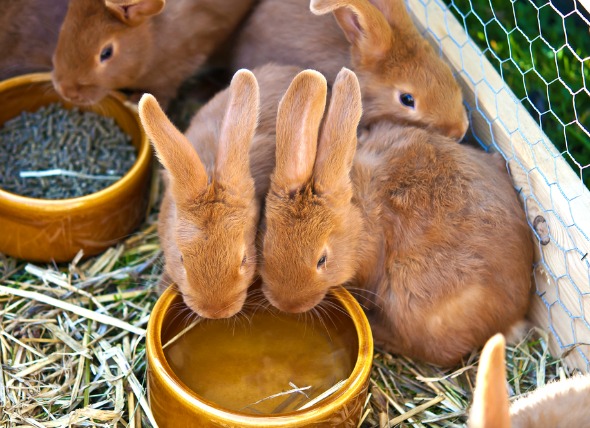

Excessive drinking, or drinking more than is typical (known as polydipsia) has a variety of possible causes. A rabbit with polydipsia will likely have polyuria, or excess urine, as an increase in thirst and an increase in water output will often go hand-in-hand. It is important to determine the cause of your rabbit’s excess thirst in order to treat any underlying disease processes that may be present.
Excess thirst in rabbits is also called polydipsia and is considered the intake of water that is above and beyond what is usual to see in a healthy rabbit.
Symptoms of Excess Thirst in Rabbits
You will notice that your rabbit is drinking more water than usual; a situation like this should always be evaluated by a veterinary professional.
Typical water intake is 50-150 ml/kg/day; should your rabbit be drinking more than that it may be a sign of a problem.
In addition to watching to see if your rabbit’s water bowl is emptied more quickly than usual, you will want to watch your rabbit’s urine output (120-130 ml/kg/day is typical) to see if it has increased or decreased and if there is any change in color.
Additional symptoms will depend upon the underlying cause of your rabbit’s excess thirst. It is a good idea to note any changes you have seen in your rabbit so you can easily describe the differences to your veterinarian.
Excessive thirst could be due to dehydration, or when accompanied with excess urine output, an underlying medical condition. An increase in your rabbit’s urination will trigger the brain to signal thirst. Conversely, excess thirst and fluid intake will lead to an increase in urination.
Causes of Excess Thirst in Rabbits
There are a variety of possible causes for your rabbit’s excess thirst, therefore it is important to have your rabbit evaluated by a veterinarian to determine whether there is an issue. Possible causes include: Increase in thirst due to hot temperatures
Diabetes or insulinoma (a pancreatic tumor)
Dehydration (in cases of dehydration, urine output will typically decrease)
Kidney disease (to include bladder stones, where mineral deposits are formed in the urinary tract).
Liver disease Drugs or large quantities of sodium chloride
Behavior issues (your rabbit may be marking territory, for example)
Treatment
How your rabbit will be treated for his excess urination will depend upon its cause. Below are some possible causes for your rabbit’s polydipsia along with what the veterinarian will consider for treatment. Diabetes Your veterinarian will look to treat the underlying cause. Often treatment will involve your rabbit losing weight and a change to a healthier diet (that includes hay and vegetables and eliminates foods with a lot of carbohydrates) may be recommended. Insulin is not necessary; rabbits can maintain their health with an appropriate diet.
Bladder Stones; Your veterinarian will consider surgery or a change in the diet of your rabbit.
Kidney and Liver Disease ; Your rabbit may need to be hospitalized in order to receive fluid therapy, which can aid liver and kidney function.
Recovery
The recovery of your rabbit will depend upon the cause of his increased thirst. You will want to follow the treatment plan recommended by your veterinarian. There are things you can do for your rabbit to help prevent the possibility of disease that can lead to excess thirst. These include:
Providing a safe, secure and non-stressful environment for your rabbit which offers shelter and an area for exercise; it should also offer your rabbit places to hide, material to nest in, toys, wood to chew, soil to dig in, etc.
Providing, clean, fresh water in a bowl that is large enough for a full day’s worth of water
Ensuring your rabbit has a healthy diet
Taking your rabbit for an overall check-up once a year, as well as anytime you notice anything unusual with him (changes in appetite, drinking, urination or activity, hair loss, changes in hair coat, etc)
Avoiding overcrowding in your rabbit’s environment
 Contact Jaguza Support
Contact Jaguza Support